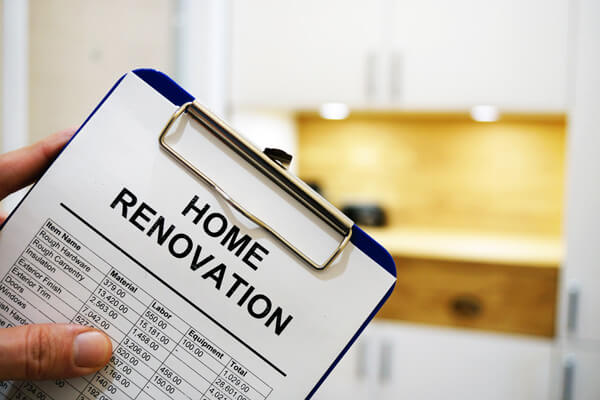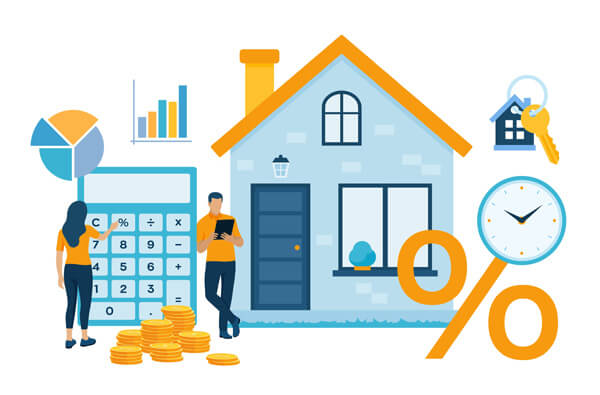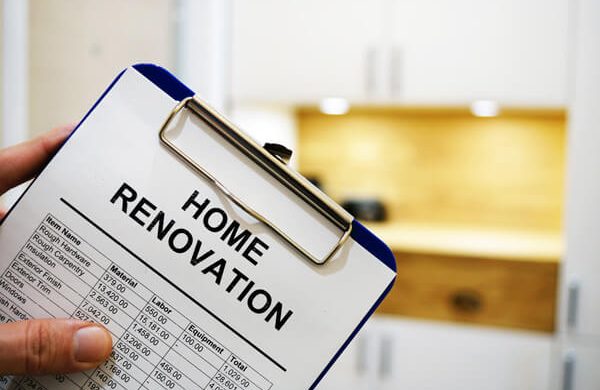COMPARE PRICES AND SERVICES TO RENOVATE ROOMS, FLOORS, WINDOWS, ETC.

GET 3 QUOTES FOR YOUR RENOVATION AND WORKS



Cost of home renovations: Ways to finance your project

Are you planning to renovate your home in 2022? Brace yourself because even simple home improvement projects cost money.
But despite the cost,homeowners must undertake home renovations from time to time to keep the home comfortable, energy-efficient, and most of all, to protect home value.
The good news is that there are ways to finance a home renovation if you don’t have enough cash saved up. Aside from regular mortgage products and loans from financial institutions, you might be qualified to apply for incentives from private companies and the government.
Find out what home renovation grants and subsidies are available so you can save on the cost of your home renovation.
At the same time, know the cost of your home renovation to help you plan your budget. Compare free and no-obligation quotes from our renovation partners using our short online form!
How much does it cost to renovate your home?

If you are on a limited budget, choosing the right type of home renovation to do first can be difficult. Knowing how to set priorities and plan well will be a big plus to a successful project.
The cost of your project depends on your location, the size of your house, its age and the home’s overall condition. However, a home renovation will be cheaper compared to buying a new home.
Many homeowners decide to renovate because they plan on staying in their home for many more years and want space that is more comfortable and enjoyable to live in. Yet, for others, a home renovation is for practical reasons such as maintaining the value of the home or increasing the selling price.
Kitchen and bathroom renovations are costly but they offer the highest return on investment. They are also, from a practical standpoint, quite popular because they are the most-used areas of the home.
ROI refers to the amount of money you can potentially recover if you sell your property.
On average, kitchen and bathroom renovations cost $25,000 to $40,000 for a mid-range project.
Unless you have a lot of cash lying around, you may want to think of improvements that will generate the highest return on your investment. It makes a lot of sense to start with the most important, such as those needing immediate repairs such as the roof, siding, or HVAC, before moving to aesthetic improvements.
Some home renovations are not very expensive. Simple updates can have a significant impact. Among those that generate good ROI and improve comfort and energyefficiency of the home are interior and exterior painting, door and window upgrades, concrete paving, and fencing.
By knowing which home renovations have the highest ROI, your home will be more appealing and have greater value.
Check out the average cost and ROI of the different types of home renovations:
| Type of Project |
Average Cost (in CAD) |
ROI |
| Painting | $4,000 – $5,000 + HST (interior walls) | 50% to 100% |
| Windows and Door replacement | $2,500 (single front door replacement without sidelight)
$800 per window |
50% to 75% |
| Bathroom renovations | $13,000 – $25,000 | 75% to 100% |
| Fencing | $2,500 for average size of yard | 25% to 50% |
| Furnace | $3,500-$5,500 | 50% to 75% |
| Concrete Paving | $5 – $18 per square foot | 25% to 75% |
| Basement renovations | $35 – $55 per square foot | 50% to 75% |
| Landscaping | $13,000++ | 25% to 50% |
Adding luxurious and unnecessary finishes don’t really give the best financial return. For instance, putting in a pool or upgrading a basement costs a lot of money but won’t increase the selling price more than the average prices in your neighborhood.
In short, emergency projects such as roof repairs, heating problems, and insulation, among others, should be tackled first.
Factors that affect the cost of a home renovation

When creating a budget for your project, take the following factors into account so you can find ways to save on costs.
Age: A 100-year old heritage home may have many secrets and can be more costly to renovate.
Size: The bigger the space, the more expensive the cost of a renovation.
Labour: If you hire a reputable contractor, it will cost more than doing it DIY or hiring a part-timer.
Scope: The more complex the project, the higher the cost. It is more expensive to tear down walls than simply painting the interior.
Timeline: Simple renovations cost less especially when they are quick to do. If you plan on selling your house and working on a deadline, your best option may be simpler and less expensive improvements like painting.
Miscellaneous: Other costs such as architectural plans, permits, temporary accommodations, etc. should also be included in your budget.
Many experts recommend setting aside 20% to 25% on top of your estimated budget to meet unexpected expenses.
How much should you budget for your home renovation?

There is really no clear answer to this question because it will depend on so many variables.
Generally, a homeowner should put spend about 1% of the property value on maintenance and improvements every year. For a home worth $500,000, a budget of $5,000 for maintenance and repairs should be set aside annually. Doing this will provide you with a nestegg to tap for unexpected renovations.
For planning purposes, below is an approximation of the cost of popular home renovations.
Bathroom renovations ($20,000)
Bathroom renovations cost an average of $20,000. The final amount varies based on updates you choose – sink, toilet, tub, vanity, tiles, countertop, floor cover, lighting, and labour.
As a rule of thumb, experts recommend spending 5% of the value of your property for your bathroom renovation. This means if your house is worth $420,000, you can spend no more than $21,000 for a bathroom renovation.
The truth is that with labour and materials on the rise, it can be difficult to stick to this rule. Work with a reputable contractor to help you with the design and materials that suit your budget.
Kitchen renovations ($25,000)
The Appraisal Institute of Canada recommends that homeowners spend up to a maximum of 15% of the value of the home for a kitchen renovation. If you plan on living in your home for a long time, maybe a lifetime, you can even increase that to 25%.
In reality, the average kitchen renovation can cost about $50,000 if you factor in new appliances, cabinets, and countertops. In the end, your selection of finishes can reduce or increase your cost.
Basement renovations ($50,000)
If you just want to put in carpet flooring or paint the basement, the bill could be $8,000 or less. But if you want major changes, such as putting in a suite, a bar, or an extra bathroom, that will cost much, much more.
Basement renovations involve putting in drywall, moisture-proofing, electrical and plumbing work, lighting, heating, flooring, and many other things. It is not uncommon for basement projects to run up a bill of $50,000.
How to finance a home improvement project

It is no funto dip into a nestegg but it is the most prudent way to finance a home improvement project. For this reason, homeowners should save up money every year and park the funds in a high-interest savings account for home renovation projects.
However, certain home renovations are emergencies and can’t wait. In that case, you can look for the best financing for your project by comparing bank products and their interest rates.
For small projects, personal loans can be a solution as they usually have quick approval time and 1 to 5 years of repayment.
For bigger projects, you may want to consider mortgage refinancing if you already have adequate equity. Mortgage loans have lower interest rates than personal loans or credit cards so it may be a worthwhile option to consider.
What is mortgage refinancing?
Mortgage refinancing allows you to tap into your home equity to use it for a home renovation. This means breaking your current mortgage by securing another mortgage loan, paying off the existing balance, and having enough extra funds to spend.
You can increase your mortgage loan based on the equity you have built up for a maximum of 80% of the property value. If your home value has increased significantly since you took out your mortgage, you may be able to benefit tremendously.
As mentioned earlier, this type of loan is better than other debts because their interest rates are generally much lower.
Just make sure to understand the cost of breaking your mortgage (you will be paying penalties to your current lender) and shop around for the best rates before you decide.
What about a home equity line of credit or HELOC?
A HELOC or home equity line of credit is a secured debt. The bank or lender takes your home as a guarantee that you can repay the loan.
Unlike a standard mortgage loan, a HELOC is a revolving credit line. It means you can reuse the funds every time you pay back as long as you stay within the maximum amount.
Some lenders offer a mortgage with a home equity line of credit. This means you can borrow up to 65% of the market value of the home. The available funds in your credit line also increase as you pay down your mortgage balance.
A home equity line of credit can also be a stand-alone loan and can be used to pay for your home renovation.
The major difference between a traditional mortgage and a home equity line of credit is that the latter does not need to be repaid based on a fixed payment schedule. Hence, it is more flexible than a mortgage.
You can speak to your lender or a mortgage broker to know whether you qualify for any of these financing options.
Federal Subsidies and grants for home renovations

You can also search for federal programs that help homeowners finance home renovations. These grants can help you save money while improving the quality of your home.
No matter where your home is located, you may be eligible for the Canada Greener Homes Grant which aims to improve energy efficiency. Available until 2028, it provides grants (maximum of $5,000) to replace doors and windows, upgrade insulation, etc. For Quebec residents, the grant must also be combined with a provincial program.
In Ontario, homeowners who desire to make their homes more energy-efficient can qualify for incentives offered by Ontario’s Green Investment Fund. This program is committed to fighting climate change. Households can lower energy bills and reduce their carbon footprint with retrofit programs offered by Enbridge and Union Gas.
The Ontario Renovates Program also gives financial assistance to qualified residents for the repair of their homes. Applicants must meet the thresholds provided for household income. The funds are designed to enable homes with substandard construction to reach minimum safety levels. These funds are forgivable loans based on the cost of the approved work.
In Toronto, the city offers the Home Energy Loan Program where you can get a low-interest loan of up to $75,000 for energy-efficiency upgrades. The loan can be paid back over 20 years.
The Quebec government also offers incentives for insulation upgrades, replacing doors and windows, and installing a water heater or heat pump through Renoclimat.
The amount of money you can obtain varies, depending on your project.
Chauffez-Vert in Quebec also offers financial assistance for energy-efficiency projects such as the replacement of an oil or propane heating system with one that is powered by electricity or renewable energy. You can submit an application 6 months (maximum) before the start of the project. You can visit their site to check how much money you can obtain for your project.
As you can see, there are different ways to get funds to pay for the cost of a home renovation. You can also start comparing quotes from various lenders by working with a reliable mortgage broker. You can start right here by filling out a short online form below!
Compare home renovation quotes and find the best financing

You are in the best place to look for home renovation contractors for your project and know the budget you need to get your project started.
Our network consists of hundreds of qualified contractors for all types of home renovations. These experts are the best people to advise you on designs, materials, and related expenses so you will know how much money you need.
Best of all, you won’t have to go somewhere else to look for mortgage refinancing or a home equity loan because our network also has reliable mortgage brokers to assist you!
2022 is the year to get your dream home with a home renovation!Whether you want a kitchen, bathroom, basement, patio, or a simple painting renovation, our partners are here to help!
Fill out the form on this page and receive FREE and NO-COMMITMENT quotes to save time and money!
Comments are closed.
COMPARE PRICES AND SERVICES TO RENOVATE ROOMS, FLOORS, WINDOWS, ETC.

GET 3 QUOTES FOR YOUR RENOVATION AND WORKS



Copyright© 2026 Compare Home Quotes.
Oolong Media






